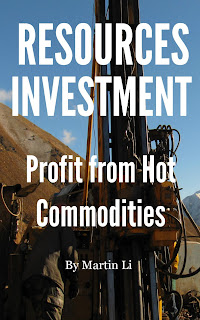Wednesday, May 1, 2013
Book Review: Resources Investment: Profit from Hot Commodities by Martin Li
The financial crisis is still growing strong in the western world and even though, no matter how hard we try, most of us don’t seem to understand what’s really going on, others see the opportunities arising from the current situation. The people who know best always say that one should invest when the markets are low. That sounds great, but invest in what? Commodities; this seems to be the answer to the question, according at least to Martin Li, the author of Resources Investment: Profit from Hot Commodities.
Li seems to know really well how the commodities market works, on which companies one should invest his or her money, and when. He goes at great lengths to explain how the financial crisis and the oil prices affect the society and why some stock prices skyrocket or fall with a bang, and he tries to solve the mystery of the eternal lust for gold.
If there’s one thing that someone could get from this book is that in the world of commodities, as well as in the marketplace, there’s no such thing as a certainty. You can buy and sell stocks, you can save your money in gold or play the exchange rate game, but at the end of the day the most important thing is to take calculated risks and don’t try too hard to make an easy profit.
There’s a lot of knowledge in these pages concerning everything that keeps this industrialist world of ours going around. The author tells us all we need to know about fuel and the precious metals, as well as for the companies that extract and distribute them to the world. He explains why things happen in one way or another, and points out the impact that China and India have as rising economies and consumer societies in today’s world. And he quotes experts in an effort to explain how our energy needs drive the prices up, along with the exhaustion of the “cheap” oil wells.
Before reading this book I was under the impression that I knew a lot about how things work in the oil and mining industry; well, I was wrong. The truth is that I knew too little, but now that has changed, since I, at last, have the full picture. You don’t have to be in finance or in one of the industries the book preoccupies itself with to read this; all you have to be is interested in the world around you, a world that changes by the day. This is a perfect guide to the turbulent economic waters of this modern era, which can easily be read and understood by one and all.
By the same author:
Inca Trails
Subscribe to:
Post Comments (Atom)


No comments:
Post a Comment